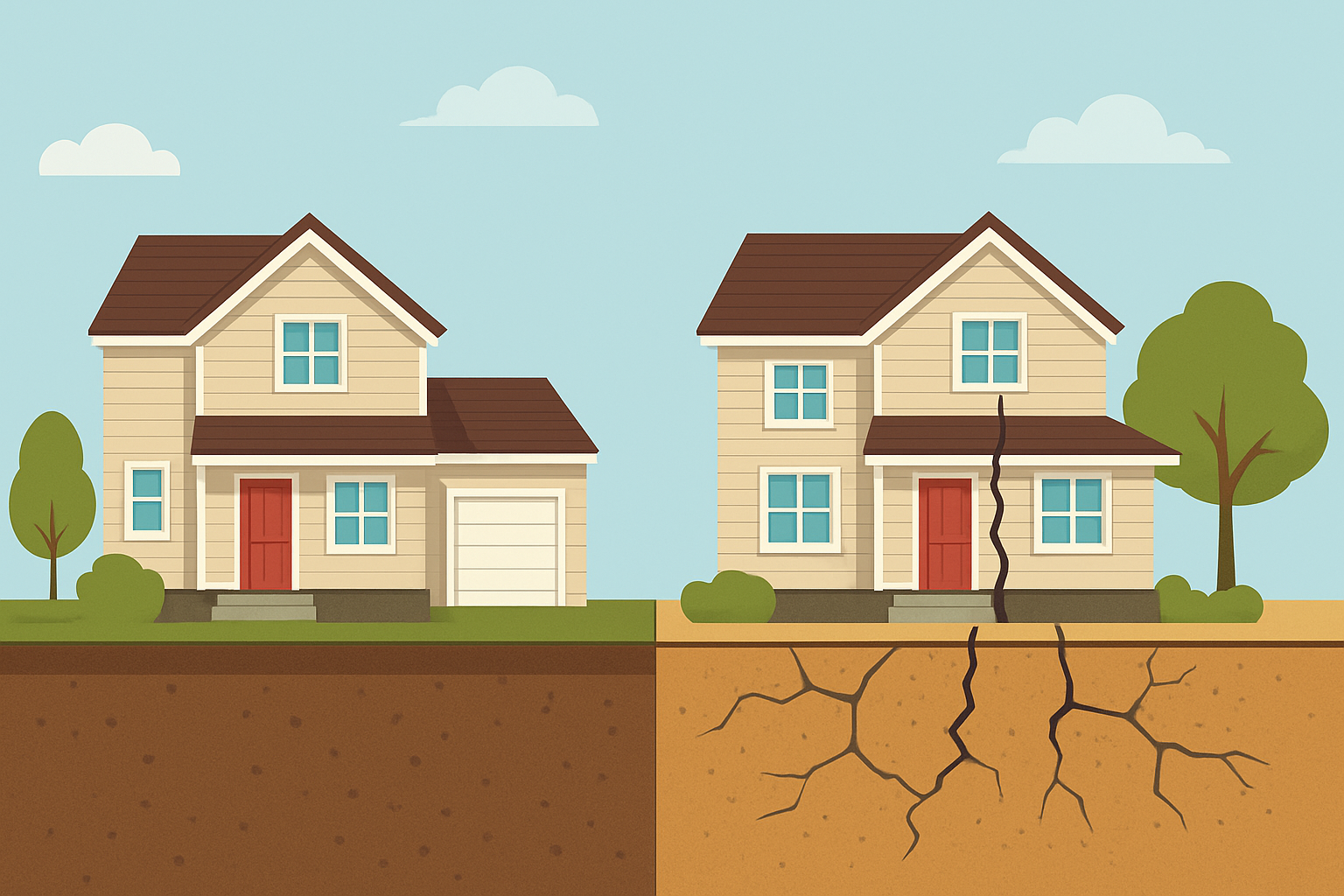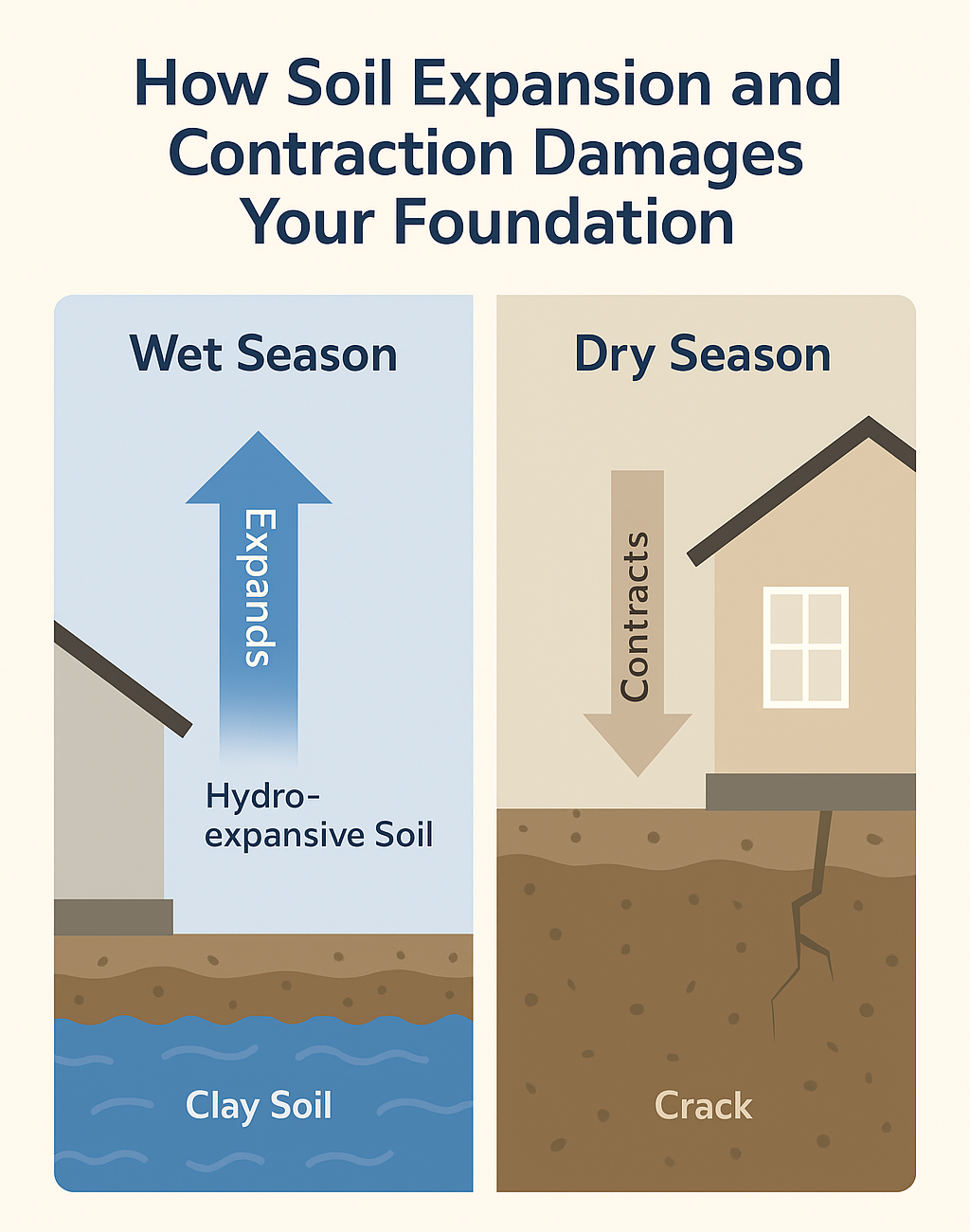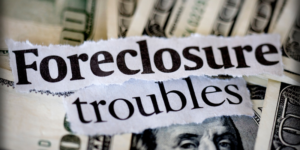
If you own a home in Texas—or are thinking about selling one—you’ve probably heard someone mention foundation problems. But what many people don’t realize is just how much Texas soil plays a role in these issues.
Unlike other states with more stable ground, Texas has unique soil conditions that can put extra pressure on your home’s foundation. And if you’re trying to sell a house that’s already showing signs of movement or cracking, understanding what’s going on underground can help you make smarter decisions moving forward.
🔑 Key Takeaways
- Texas has some of the most expansive and unstable soil types in the U.S., which puts homes at higher risk for foundation issues.
- Seasonal changes—especially long dry periods followed by rain—can cause soil to expand and contract, leading to structural damage.
- Certain regions in Texas (like Houston, Austin, and Dallas) are more prone to soil-related foundation movement than others.
- Documenting damage and getting a foundation or soil report can help sellers build trust and avoid legal issues.
- Selling as-is is a valid option if foundation repairs feel overwhelming—especially when working with a cash buyer familiar with these conditions.
The Problem Starts Beneath the Surface
In large parts of Texas, the soil is rich in clay—especially types like expansive clay (e.g., Houston Black or Eagle Ford Shale). This soil behaves like a sponge. When it rains, it soaks up water and swells. When it dries out, it contracts. This constant cycle of expansion and shrinkage creates stress on your foundation over time.
In fact, this type of soil movement is one of the leading causes of foundation problems in Texas.

Seasonal Shifts: Why Some Months Are Worse Than Others
Texas summers can be brutal—long stretches of drought followed by sudden rainstorms. These quick moisture changes cause the soil to expand and contract more dramatically, which is why some homeowners start noticing new cracks or sticking doors during certain seasons.
Seller Tip:
If your house shows more signs of shifting after a rainy period or a heatwave, you may want to document the damage (photos + dates). This can help you track whether the movement is active or stable—something buyers or inspectors may ask about.
Is All Soil in Texas Problematic?
Not necessarily. The level of risk depends on where you are in the state.
- Central Texas (Austin, San Antonio): Known for expansive clay soil with moderate-to-high movement potential
- North Texas (Dallas-Fort Worth): High shrink-swell potential—foundation movement is common
- Houston & Gulf Coast: Clay-rich soil combined with poor drainage creates one of the most challenging environments
- West Texas: More arid, with sandy or rocky soils that are generally more stable
Types of Soil Commonly Found in Texas
Certain soil types in Texas are more prone to causing foundation movement than others. Here are a few to be aware of:
- Houston Black Clay – A dark, expansive clay found in Central and Southeast Texas. Known for swelling when wet and shrinking when dry—often a culprit in foundation damage.
- Eagle Ford Shale – A clay-rich soil common in North and Central Texas that’s reactive to moisture and contributes to structural movement.
- Sandy Loam – Found in parts of East and West Texas, this soil drains well and tends to be more stable than heavy clay.
- Caliche – A dense, limestone-based soil mostly in West Texas. While relatively stable, it can make excavation and root growth difficult.
🏡 If you’re in a high-risk area, it doesn’t automatically mean your house has foundation problems—but it does mean you should stay alert to signs and possibly get a routine inspection.
How to Reduce Soil-Related Risks (Even If You’re Not Ready to Sell)
Even if you’re not planning to sell right away, there are a few proactive steps you can take to help minimize soil movement and protect your foundation. This simple guide from FoundationRepairs.com breaks down how moisture control, drainage, and landscaping choices can make a big difference.
- Install or maintain gutters and downspouts: Proper drainage keeps water from pooling near your foundation.
- Use soaker hoses during dry seasons: Keeping the soil evenly moist around your home reduces dramatic shrink-swell cycles.
- Grade your yard away from the house: This helps water flow away rather than settle near the base.
- Avoid planting large trees too close: Roots can dry out surrounding soil and contribute to uneven settling.
💡 These improvements may not completely prevent foundation problems, but they can help reduce risk—and show buyers you’ve taken responsible care of the property.
What Sellers Can Do (Even If They’re Not Fixing It)
If you’re planning to sell, you might be tempted to ignore the issue or hope no one notices. But foundation concerns are one of the top reasons a buyer backs out of a deal—especially if they’re using financing.
Here’s what you can do:
- Disclose early: Being upfront about soil movement and any known foundation history builds trust. Hiding it could lead to legal issues.
- Get a soil or foundation report: This helps validate your claims if a buyer wants proof that the house is structurally sound—or at least stable.
- Consider an as-is sale: If the soil in your area has already led to visible damage, you might choose to sell without repairs and let the buyer decide what to do.
👉 Want to avoid dealing with repairs? At TX Cash Home Buyers, we regularly purchase homes with soil-related foundation issues. You don’t have to fix anything. Just tell us about the property, and we’ll make you a no-obligation offer.
Final Thoughts: Don’t Underestimate the Dirt
Texas soil isn’t something most homeowners think about—until it starts affecting the house. Whether you’re seeing early signs of damage or trying to decide if you should fix a shifting foundation before selling, understanding how the ground under your home behaves is a powerful first step.
And if you’re feeling overwhelmed? You don’t have to figure it all out alone. TX Cash Home Buyers is here to walk you through your options—whether that means fixing it, disclosing it, or simply walking away without the extra hassle.
Looking to Sell in Your Area?
If foundation issues are making it harder to sell, we can help—no matter where you are in Texas.
Check out our local home-buying pages to see how we can help in your area:
- Sell My House Fast in Houston
- Sell My House Fast in Dallas
- Sell My House Fast in San Antonio
- Sell My House Fast in Austin
No repairs, no agent fees—just a straightforward way to move forward and sell your house as-is for a fair cash offer.
👉 [Start the conversation today with a free consultation »]
Related Articles
- Sell Your Houston Foundation-Problem Home As-Is
- Houston Homeowner’s Guide to Selling a Flood Zone Property
- How Texas Soil Can Damage Your Home’s Foundation
- Messy Title Problems in Texas: What Every Homeowner Needs to Know
- Selling a Problem Property? Here’s the Fastest Way
- Can You Sell a House with Mold Problems? Yes, Here’s How
Frequently Asked Questions About Texas Soil and Foundation Issues
1. How does Texas clay soil affect home foundations?
Clay soil expands when wet and contracts when dry, which puts repeated pressure on your home’s foundation. Over time, this can cause cracks, shifting, or uneven settling—especially in areas like Houston, Austin, or Dallas where expansive clay is common.
2. What are the signs that soil movement is damaging my foundation?
Look for cracks in walls, sticking doors, sloping floors, or gaps around windows and baseboards. These are common signs of foundation movement caused by shifting soil beneath the home.
3. Do I need to disclose soil-related foundation issues when selling my house in Texas?
Yes. If you’re aware of foundation problems—even if they’re due to natural soil movement—you are legally required to disclose them to potential buyers in Texas.
4. Is it better to fix foundation damage or sell as-is in Texas?
It depends on your goals. If you have time and budget, repairs may help attract more buyers. But if you’re looking for a fast, less stressful option, selling as-is to a cash buyer can save time and money—especially if the home is in a high-risk soil area.
5. How can I protect my home from foundation damage caused by soil?
You can help minimize damage by maintaining proper drainage, using soaker hoses during dry spells, avoiding large trees near the home, and grading your yard to slope away from the foundation.
Disclaimer:
The content provided on this blog is for informational purposes only. We are not attorneys or tax professionals. For personalized legal or tax advice, please consult with a qualified professional.
Written by Lisa Martinez, Founder of TX Cash Home Buyers

About The Company
TX Cash Home Buyers helps Texas homeowners sell quickly and simply, even in tough situations like repairs, inherited homes, or financial stress. We’re known for our local experience, fair offers, and commitment to guiding sellers through off-market sales with clarity and care.



